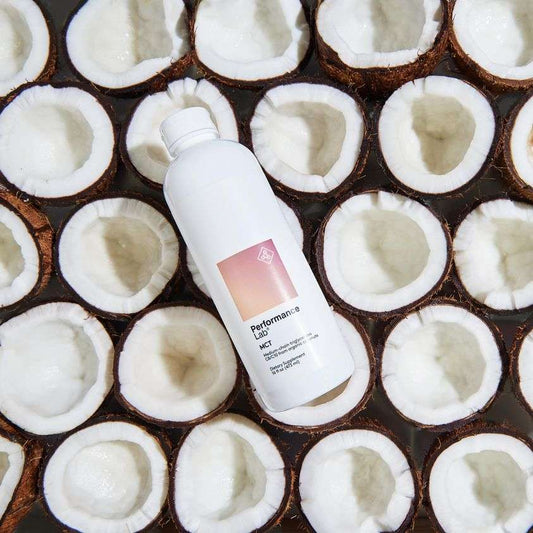Your brain makes only a tiny percentage of your entire body weight but consumes over 20% of your body’s energy. It’s pretty shocking, but makes total sense when you think about everything the brain controls.
And while the brain runs preferentially on glucose, there’s another form of energy it can use - ketones. Ketones are produced endogenously using fat, and aside from body fat, one of the best and cleanest fats you can provide is MCT.
But MCT does more than just fuel your brain—it fuels your entire body and is especially great during periods of fasting.
Whether you’re looking to lose weight, increase energy, boost brain function, or enhance your performance, fasting is a great practice to incorporate into your daily routine. And if you’ve ever tried fasting, you’re probably well aware that it’s not easy—especially if you’re fasting through the daytime.
The Brussels sprouts you turned your nose up at? Or maybe those leftovers you had no interest in eating? Yeah, we bet they’re looking pretty tasty right about now.
Boosting your energy during periods of fasting can be a challenge for even the best of us, and if you’re not into getting the coffee shakes from trying to use caffeine, we have a better solution: MCT oil.
But doesn’t consuming something with calories break the fast?
Technically yes, but there’s something about MCT oil that makes it a little bit different, and that’s what we’re going to look at.
If you’ve started fasting and need a little pick-me-up to keep you going but aren’t sure what’s suitable, this article is for you!
What Is Fasting?
Fasting can take on several forms, but the idea behind each type is the same—abstaining from food for a specific period.
Basically, it’s the science of going without. It means rearranging your eating schedule to cycle between periods of fasting and periods of feasting.
But with fasting, the focus isn’t so much on what you’re eating, but when you’re eating.
The Benefits Of Fasting
When you see the impressive list of benefits that fasting boasts, you’ll understand why it’s so popular 1-5:
- Accelerates fat loss: Prolonged periods without food stimulate lipolysis and fat burning by regulating levels of visceral fat and adipokines (leptin, IL-6, TNF-α, and IGF-1)
- Improves cognitive function: Fasting enhances the release of brain-derived neurotrophic factor (BDNF), a protein involved in strengthening certain brain pathways and increasing cognitive efficiency
- Improves glucose and insulin regulation: IF helps to boost insulin-mediated glucose uptake in tissues and may also help normalize certain biomarkers associated with chronic disease
- Recycles faulty mitochondria: Mitochondria are the body’s major energy producers, and periods of fasting stimulates a process called autophagy whereby old and dysfunctional cells are culled to allow for the growth of new ones
- Regulates inflammation: Inflammation and oxidative stress are the roots of many chronic health conditions, and fasting may help to boost the body’s resistance to stress, reduce free radicals, decrease levels of proinflammatory cytokines, and upregulate specific anti-inflammatory pathways
Why MCT?
Compared with other fats, MCT kind of falls into a rank of its own. It’s a unique fat derived from coconut and palm but also found naturally in certain dairy products.
While the group of medium-chain triglycerides is composed of 4 fats—caproic acid (C6), caprylic acid (C8), capric acid (C10), and lauric acid (C12)—MCT oil itself usually only contains two, caprylic and capric acid, with the former being preferred due to its more rapid absorption.
But to understand why MCT is such a God on the keto diet and when fasting, you have to understand how fats are normally digested.
When consumed, the gallbladder is triggered to release bile, which emulsifies fats and allows them to be digested and absorbed into the bloodstream.
But before that can happen, long-chain fatty acids (LCFAs) are hydrolyzed by pancreatic lipase (an enzyme), re-esterified, and released as chylomicrons into the lymphatic vessels before they can reach systemic circulation 6.
Short- and medium-chain fatty acids, on the other hand, pass directly into the portal vein without being re-esterified 1. This property is exactly why people love them, and we’ll talk more about it further down.
The Benefits Of MCT Oil While Fasting
When you look at why people love MCT oil, there’s no shortage of proposed and proven benefits.
Here are some of the most notable reasons everyone from doctors and healthcare workers to athletes and nutritionists recommend MCT oil.
- Boosts energy—MCT is one of the fastest and cleanest fuel sources for your body. Because MCTs enter cells without being broken down, they can be used immediately to supercharge your energy.
- Regulates appetite—Fat is satiating; we all know that. Studies show that MCT, specifically, may help alter gut hormones and stimulate thermal and oxidative pathways that enhance thermogenesis and satiety, thereby curbing appetite and reducing energy intake 8.
- Encourages fat burning—Depending on the length of your fast—whether you’re doing intermittent or multiple days, the body can enter a state of ketosis; even if you’re doing prolonged intermittent fasting, your body can still burn through glycogen reserves, and once those are gone, it’ll start burning fat.
- Enhances cognitive function—Anyone who’s ever tried fasting is probably familiar with the brain fog that can come along with it; that hazy, fuzzy, I’m not really sure what I’m doing kind of feeling. It’s not pleasant, but throwing in some MCT oil mid-fast could help to mitigate the effects by encouraging your body to produce ketones, which can readily cross the blood-brain barrier and provide one of the cleanest sources of energy, thereby reducing brain fog and ushering in pure, blissful mental clarity.
MCT and Fasting
As we touched on before, the way MCTs are digested is precisely why MCTs are so popular during fasting.
Here’s a better explanation of why.
Compared to long-chain fatty acids, MCTs are metabolized differently. Whereas LCFAs require bile for emulsification, incorporation into chylomicrons and the lymphatic system before being transferred into portal circulation, the digestion of medium-chain fats is relatively simple.
They are absorbed intact, transported to the liver intact, and are preferentially available for hepatic mitochondrial β-oxidation (i.e., energy production). They skip the entire digestive process and are utilized almost immediately for energy production 9.
And because of the unique way they’re processed, they’re rarely stored as fat. Studies show that MCTs are oxidized to a greater extent than long-chain fats, which means they have less opportunity for deposition into adipose tissue 10.
But because MCT oil also doesn’t trigger an insulin response 11, you’re technically eating and consuming calories (relatively few), but you’re not getting the same response from your body that you would with a meal. As such, you can still get the benefits of fasting.
How Much MCT Should You Take While Fasting?
For most people, consuming MCT upon waking is the ideal time during a fast because it helps to boost energy levels and suppress any morning hunger until you finish your fast. But depending on the type of fasting you’re doing (24 hours, 16:8, 5/2), when you take your MCT may change.
If curbing your appetite is what you want, it may seem logical to load up on the MCT—but not so fast. There are two reasons for this: MCT oil still contains calories, and excessive calories will break your fast; and if your body isn’t used to MCT oil, too much can have a laxative effect and cause some pretty crappy side effects like abdominal pain, cramping, and diarrhea.
So, if you want to reap the benefits of MCT while still getting those from fasting, the right dose is important. Basically, you only want to take enough MCT oil to keep you going until you break your fast (i.e. suppress your hunger and prevent fatigue). The rest of the ideal dose can be taken alongside food or after you eat.
For most people, 1-2 teaspoons is enough to maintain energy and curb hunger for the time being. Because remember, MCT isn’t there to actually provide calories and substitute a meal; it’s there to support your energy demands during a fast.
Related Post: Does Prebiotic Fiber Break a Fast? - A Complete Guide
Final Thoughts
For people who regularly fast and struggle to hit their hour goal, adding in a bit of MCT oil can be a great way to curb hunger and increase energy to get you to that 16-hour mark. And as long as you’re not using it as a crutch or sub for a meal, there’s no harm in it actually breaking your fast.
However, because all MCT products are different, you want to ensure that you’re actually consuming a pure product with C8 and C10 fats only. For us, we’re obviously partial to Performance Lab MCT.

It’s sourced from organic, non-GMO coconuts and contains C8+C10 MCTs only, so you don’t have to worry about kicking your digestive function on. All you’re getting is pure, clean energy to power you through your fast and other daily activities!
References
- SM Aly. Role of intermittent fasting on improving health and reducing diseases. Int J Health Sci (Qassim). 2014; 8(3): V-VI.
- SM Rothman, KJ Griffioen, R Wan, MP Mattson. Brain-derived neurotrophic factor as a regulator of systemic and brain energy metabolism and cardiovascular health. Ann N Y Acad Sci. 2012; 1264(1): 49-63.
- RE Patterson, DD Sears. Metabolic Effects of Intermittent Fasting. Annu Rev Nutr. 2017; 37: 371-393.
- M Bagherniya, AE Butler, GE Barreto, A Sahebkar. The effect of fasting or calorie restriction on autophagy induction: A review of the literature. Ageing Res Rev. 2018; 47: 183-197.
- MA Faris, S Kacimi, RA Al-Kurd, et al. Intermittent fasting during Ramadan attenuates proinflammatory cytokines and immune cells in healthy subjects. Nutr Res. 2012; 32(12): 947-955.
- E Cabré, JM Hernández-Pérez, L Fluvià, C Pastor, A Corominas, MA Gassull. Absorption and transport of dietary long-chain fatty acids in cirrhosis: a stable-isotope-tracing study. Am J Clin Nutr. 2005;81(3):692-701.
- AC Bach, VK Babayan. Medium-chain triglycerides: an update. Am J Clin Nutr. 1982;36(5):950-962.
- MP St-Onge, B Mayrsohn, M O'Keeffe, HR Kissileff, AR Choudhury, B Laferrère. Impact of medium and long chain triglycerides consumption on appetite and food intake in overweight men. Eur J Clin Nutr. 2014;68(10):1134-1140.
- C Beermann, J Jelinek, T Reinecker, A Hauenschild, G Boehm, HU Klör. Short term effects of dietary medium-chain fatty acids and n-3 long-chain polyunsaturated fatty acids on the fat metabolism of healthy volunteers. Lipids Health Dis. 2003;2:10.
- MP St-Onge. Dietary fats, teas, dairy, and nuts: potential functional foods for weight control? Am J Clin Nutr. 2005;81(1):7-15.
- DD Thomas, MC Stockman, L Yu, et al. Effects of medium chain triglycerides supplementation on insulin sensitivity and beta cell function: A feasibility study. PLoS One. 2019;14(12):e0226200.















